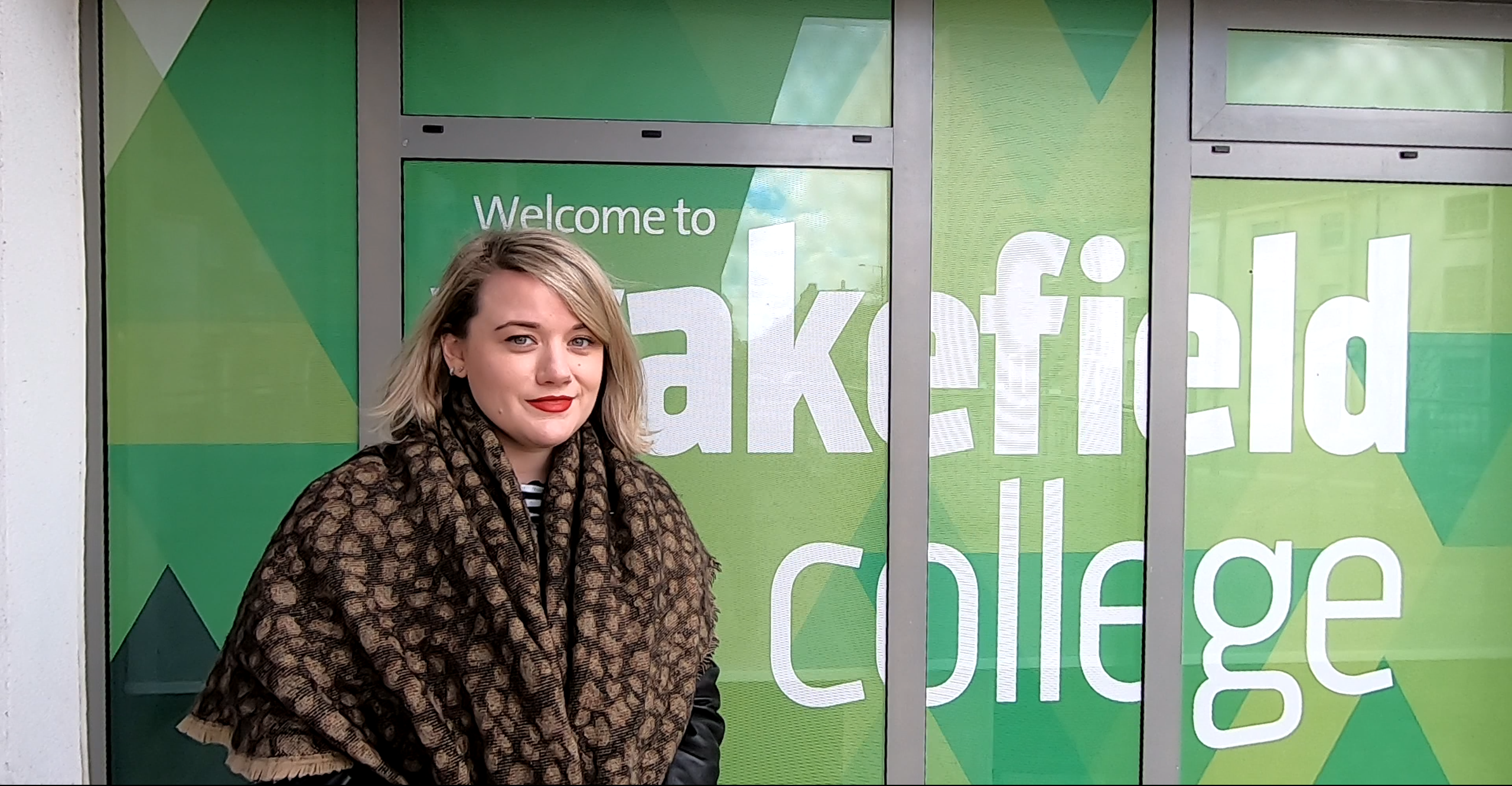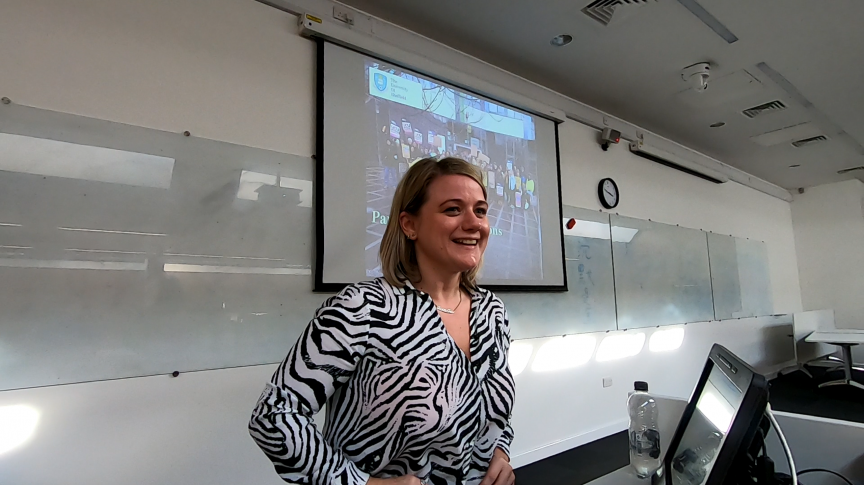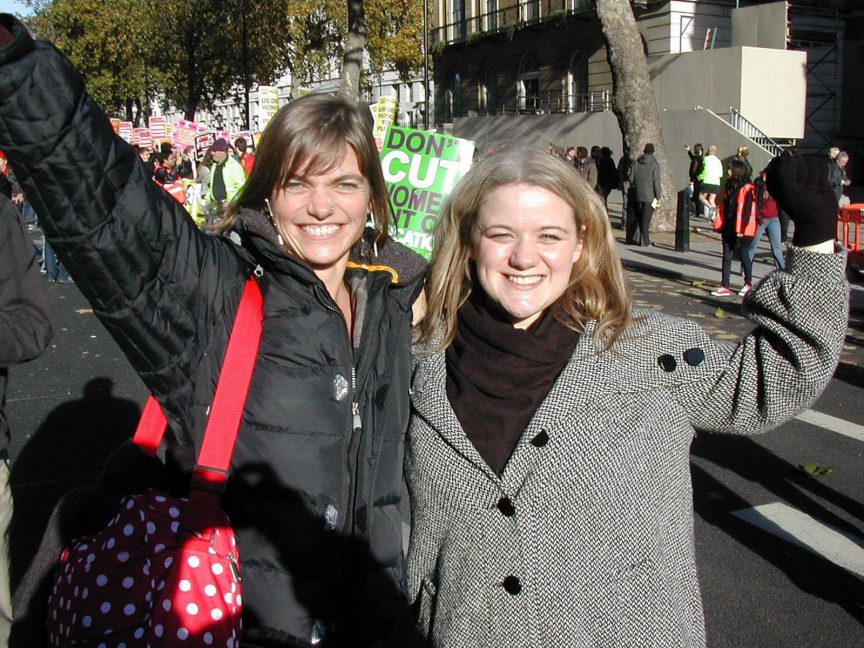
By any measure, Jo Grady’s election to the helm of the University and College Union has been volcanic. An outsider, rank-and-file candidate standing on a manifesto which pledges to increase member participation, challenge the government’s ‘hostile environment’ policies, and make the office of general secretary more accountable, Grady was last week elected with an unprecedented landslide on a vastly increased turnout.
Having received 11,515 votes in the first round – 5,411 more than the second-placed candidate – and 64% in the final runoff, she will take office this year as UCU’s first rank-and-file general secretary, with an indisputable mandate to implement her ‘Manifesto for a Modern Education Union’.
Within higher education, Grady became a nationally recognisable activist during UCU’s 2018 pensions strike, largely thanks to her involvement with USS Briefs, a collaborative multimedia project which encouraged greater understanding of the dispute surrounding the universities superannuation scheme. She was later elected to the union’s national dispute committee and its national executive committee.
Grady will now represent tertiary education workers across higher and further education as well as prison and adult education, but there’s no question that her election can be traced back to last year’s strike.
“I think last year laid the foundations for people to have a bit of courage that [the election of a rank-and-file candidate] could happen,” says Grady, speaking to Novara Media at UCU’s annual congress in Harrogate. “But it also demonstrated that when we actually believe in ourselves and use our skills, we win and we get stuff done.”
Last year’s pensions strike was notable not only for being the largest and most sustained in UCU’s 13-year history, but also for the level of participation from younger, more precariously employed researchers and teachers. In recent years, at both branch and national level, anti-casualisation initiatives have been reshaping the union’s activities. But it has been an uphill struggle, with many branches having to push hard to force casualisation onto the agenda. Grady’s manifesto pledges to make job security a campaigning priority.
“If you have gone through your academic career and you’ve had the good grace that you’ve never been on a precarious contract, it’s not necessarily that you’re not concerned, you just probably don’t really see it,” says Grady. “There’s still a good deal of people who think it’s a rite of passage, and I think we can’t lose touch from [the fact] that not only is precarity growing but it trickles up and we have to keep at the forefront of including those voices in what we do because otherwise we’re just going to manage our union and sector into insignificance.”

Grady has a keen understanding of the line unions walk when it comes to being changing with the times. Now a senior lecturer in industrial relations at the University of Sheffield, her PhD considered the sacrifices made by the trade union movement through its collaboration with neoliberalism. But it’s clear from spending time with Grady that any notes of cynicism ultimately come from a place of passion. Brought up in a pub in central Wakefield, Grady was born into a striking mining family shortly after the 1984/5 strike began.
“I’m really a mixed bag,” she says. “The circumstances in which I was delivered into this world mean I have an almost visceral attachment to trade unions and believe in them and their power to change and defend and to be transformative, and without a doubt when we work together, we win – or we can win. But also my PhD was about criticising trade unions who’d become collaborators in a neoliberal project under New Labour.
“I can be very cynical of what unions can become, but also think they can be amazing and represent one of our best mechanisms for working collectively for change, and I think that we have to keep in mind when we become involved in our trade union – or get employed by it – what is it we’re trying to achieve? One of the reasons I called my manifesto ‘A Manifesto for a Modern Education Union’ is that I really want to centre the political importance of education.”
Grady’s vision of education is inflected with her labour movement principles – she sees it as a profession to defend, yes, but fundamentally as a social good. It’s a key theme of Grady’s inaugural address to this year’s congress, in which she admonishes employers’ attempts to use the social value of education to deter educators from sticking up for themselves and the sector. How does she respond to arguments that a more strident UCU could invoke the ire of students?
“I would say a political education of calling out the rotten core of the neoliberalisation of our colleges, of our universities, of how we educate people who are in prison, is an important education,” she ripostes. She points to the example of last year’s strike.
“Our students didn’t blame us, despite our institutions’ best attempts to weaponise them against us; they demonstrated that actually in the occupations it was universities who cut off sanitation to some students, it was universities who threatened them with police action afterwards, and it reminded everybody what happened in 2010 when universities took similar action.”

It’s not an academic point – Grady spent much of winter 2010 stuck in police kettles along with thousands of other students and education staff in the movement against tuition fees and education cuts.
“It’s universities who’ve been stripping mental health provision,” she continues, “and when students do go to counselling services and confess to having had suicidal thoughts [universities] suspend their studies with no further access to mental health provision – for international students that means they don’t have a visa.
“So I feel like the whole idea that we have to not withdraw our labour is just absurd. Because the political point of actually correcting this is what we should be focused on. We’re not here to be shock absorbers for a neoliberal education system.”
Grady is fluent when it comes to the scale of the tasks facing unionised educators and support staff. Her mantra is to be “honest with people about what you can achieve but raise their expectations and bring them in.” It’s a code that evokes the US organiser Jane McAlevey, author of Raising Expectations and Raising Hell and No Shortcuts: Organizing for Power in the New Gilded Age. Indeed, eagle-eyed readers will pick up on such references in Grady’s manifesto. She sees her tenure as general secretary as a collective endeavour, and one that is as much about building power as representing members.
“I’ve made it very clear that I don’t want to be a gen sec who’s just down in London, because the challenge for a rank-and-file candidate once they get elected is that they then become part of the machine and they lose touch with the very base that elected them,” she says.
“I think it’s obviously going to be a really hard job but it’s a job that I’m really happy and willing to do. But I also think that, clearly, there is an electorate that really wants to help me do it, because that [turnout] increase from 13.7 to 20.5%, all of those people voted for a union with this blueprint, they understand there are no shortcuts because they have been working as hard [as they can] in their branches to try to get casualisation motions through, but they’re not seeing it in pay claims and they’re not seeing it in the other issues, whether it’s ethnicity or gender pay gaps.”
But what does being a general secretary who can bridge the head office and rank-and-file look like? Grady appears keen to explore more dynamic forms of engagement, as well more radical ways to ensure the union is transparent and accountable. One such suggestion is the exploration of open negotiations, a tactic more familiar in continental Europe, where negotiations between bosses and union leaders are broadcast.
“I would love to open up the idea with employers of open negotiations,” says Grady. “At base it could mean that the negotiation on pay, pensions, etc. would be public – in some circumstances could be livestreamed. Employers hate to do it because they obviously feel very exposed by it, and if you are a trade unionist who doesn’t want to be fully accountable you might hate it as well. I would say it makes everybody honest because members know that I’m working as hard for them as possible and employers know that they can’t hoodwink you.”
Another of Grady’s ideas is the creation of member task groups – time-limited working groups that would sit alongside or bridge existing national committees with a particular brief, such as responding to the government’s ‘hostile environment’ policies or increasing the participation of members in more neglected roles, such as professional services. Grady hopes they will bring innovation into the union’s campaigning, such as identifying new areas for leverage, while appealing to members who find the existing structures inaccessible or overly demanding. It’s a noble idea, but one likely to raise some eyebrows from within the existing structures.
“The structures we have are incredibly important; they make up the democratic procedures of our union. But what we’ve seen is that issues such as casualisation, issues that affect marginalised members in general, members with disabilities who are being performance-managed out, or women who are being sexually harassed – you don’t see those members represented through the committee structures,” says Grady. “We know these issues are the pressing issues of our union, so we have to find a way to bring those voices in.”
Grady’s approach seems a far cry from the union’s recent history. Although disrupted by Grady’s election, this year’s congress still sits in the shadow of 2018’s annual congress, which was abandoned following walkouts over a debate on whether a no-confidence motion in the previous general secretary, Sally Hunt, should be discussed. The motion criticised Hunt’s handling of the conclusion of last year’s pensions strike, and while it was never ultimately debated, the 2018 congress did create a democracy commission, mandated to explore (among other things) the possibility of making the general secretary recallable in future.
Hunt resigned on health grounds in February 2019, triggering this year’s contest, but the democracy commission is ongoing. A key plank of Grady’s manifesto, confirmed in her inaugural speech, is to accept its recommendations if adopted by next year’s congress and to accept any changes to her employment contract as a result. It’s a position that feels consistent with her insistence that the office of general secretary is political before being professional, and that democracy and transparency go hand-in-hand.

“Our union would benefit from becoming a lot more open and transparent,” says Grady. “I think the unfortunate incident that happened last year is because people were demanding accountability and transparency, and it wasn’t there. The picket line had been characterised by sharing, by transparency, by democracy, by educating each other, and the reason why something like USS Briefs was as popular as it was is because people were starved of information. We’re a union. I think as a union we must possibly be the most highly-skilled union in the UK in terms of diversification of different skills – to me it seems reasonable to use those skills and be transparent about things rather than keep that knowledge at bay.
“The USS [pensions] strike was almost like pressing reboot on everything, and employers didn’t know how to cope with it. I think we need to start using tools and skills at our disposal that will do that, because they want to play us off against each other.”
Throughout our interview, Grady is eloquent and confident, not just in herself but in the strength the membership brings to the union. Indeed, it is striking that she sees the role of the membership not as merely providing a steer for the union’s elected leaders, but as its key asset and resource in developing new ideas and building power across the tertiary education sector. While refreshing, such a hands-on approach feels unsurprising coming out of Sheffield UCU, a “shit-hot” branch, in Grady’s words, which has developed a national reputation its proactivity. At this congress, the branch is leading the conversation on both migrant organising and trans rights. I have to ask: what’s in the water in Sheffield?
“Steel!” she laughs. I wouldn’t be surprised – it’s a branch which is the envy of many others.
“I’m not suggesting age is important here but it’s got a lot of ‘younger’ members, and I think if you’re younger and employed in universities you know what it’s like to probably have paid higher fees, been shafted by neoliberalism, been on some sort of precarious contract or the person you love or live with has, you probably don’t own a house and have sinkhole rent, so I feel like there’s an idea that you’re just not going to put up with this shit anymore, essentially.
“I just think that there’s a burning injustice amongst people who have either been marginalised or experienced the realities of precarity, and I think that last year there was a feeling that we’d all been sleepwalking a little bit, and everybody woke up. And nobody’s going back to sleep until we’ve sorted it. It might take five years or it might take a lifetime to sort, but I think the idea that we just tolerate a managed decline because we can’t expect any better has just been entirely rejected.”
Craig Gent is Novara Media’s north of England editor and the author of Cyberboss (2024, Verso Books).